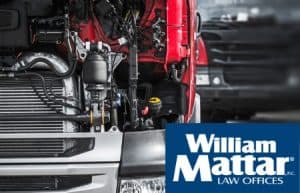
When tractor-trailers – also known as 18-wheelers or big rigs – are involved in motor vehicle accidents, the consequences can be severe. In the United States, over 4,657 large trucks were involved in fatal traffic accidents in 2017. Both truck drivers and the occupants of other motor vehicles have lost their lives in these truck-related accidents.
There are numerous factors that can contribute to an 18-wheeler accident, including truck driver fatigue, improper loading of cargo, drunk driving, and mechanical issues. No matter the cause of a tractor-trailer crash, the people involved can suffer serious, life-altering injuries. If you’ve been injured in a truck accident, contact William Mattar law offices today. Our personal injury attorneys are available 24/7 to speak with you about your case.
Truck Driver Fatigue
Fatigue is a major cause of tractor-trailer accidents.
In a study analyzing "critical reasons" for commercial truck accidents, data showed that 12 percent of crashes were caused by “non-performance” issues, which includes truck drivers who fall asleep while driving, or were otherwise physically impaired, resulting in an accident.
Many truck drivers work long hours and are often required to be awake for extended periods of time. Sleep deprivation can lead to lack of focus, resulting in mistakes and misjudgment on the road. Fatigue can also affect a driver’s response time, or ability to regain control of a truck when faced with a potential road hazard. These tragic accidents often happen on highways, where truck drivers are traveling long distances to their destination.
Heavy/Unsecured Cargo
Tractor-trailers often transport cargo, including large or heavy materials. Cargo must be loaded properly to meet certain specifications, including limits for weight and size. This is because trucks have different capacities. Trucks that carry hazardous materials also have handling and storage regulations to prevent the migration of harmful substances onto roadways.
Cargo that is not loaded, secured, or regulated properly can contribute to a tractor-trailer crash. If material is unbalanced or too heavy, it can make driving the vehicle difficult or cause the truck to tip, roll, or shift while in transport. Material that is improperly secured can also escape onto the road, creating dangerous road conditions for other drivers and potentially causing crashes.
Driving Under the Influence
Driving under the influence of drugs or alcohol is dangerous. Driving a large commercial truck while impaired can be even more catastrophic.
Impaired driving is a leading risk factor in tractor-trailer accidents. Truck drivers could work hours on end without a proper break or rest, and as a result, some drivers turn to substances such as stimulants to stay awake, according to the results of a 2013 review of studies.
Drugs and alcohol can cause side effects that lead to driving error and an increased chance that a truck accident will occur. Some symptoms of amphetamine use include hallucinations, irritation, and vertigo. Alcohol can cause drowsiness, decreased concentration, and overall impairment. Clearly, the effects of these substances are not conducive to driving safely on public roadways.
Blind Spots
Tractor-trailer crashes can occur when a truck driver fails to see a smaller vehicle in their blind spot, causing a collision. The blind spots of a large truck are very different from a passenger car or SUV because of the comparative difference in size and length. It is important for motorists to be aware of truck driving patterns and potential blind spots. Truck drivers themselves should also exercise caution when it comes changing lanes or making turns, to minimize the risks posed by limited visibility.
The blind spots of a truck include:
- Directly in front of the truck cab, extending approximately 20 feet;
- Directly behind the trailer, extending approximately 30 feet; and
- On the left and right sides, under the truck driver’s mirrors.
If you’ve been injured in an accident while in a truck driver’s blind spot, give the truck accident lawyers at William Mattar Law Offices a call today.
Mechanical/Maintenance Problems

Mechanical issues can also play a role in 18-wheeler accidents. Depending on the circumstances, a truck driver or trucking company may or may not be aware of potential mechanical problems that pose a major risk. Other times, failures are caused by a lack of routine maintenance and care.
One example of a common mechanical issue is a faulty braking system. Faulty brakes or worn brake pads on a large truck can contribute to truck accidents. When a mechanical system fails, it can be very dangerous for truck drivers and others traveling on the road. Mechanical- and maintenance-related issues include, but are not limited to:
- Underinflated tires;
- Improper safety features/measures;
- Cracked windshield;
- Lighting system outages, including headlights and taillights;
- Transmission failure;
- Faulty steering or suspension;
- “Coupling equipment” failure, such as an unhinged trailer; and
- Issue with windshield wipers, especially in bad weather conditions.
Tire maintenance is particularly important when it comes to tractor-trailers because truck tires are often required to carry heavy loads. When the tires of a truck are not properly inflated, or are carrying too much weight, they can blow out and cause the vehicle to spin out or roll.
Contact a Tractor-Trailer Crash Attorney Today
If you’ve been seriously injured in a tractor-trailer crash, William Mattar is here to help. Our experienced truck accident attorneys have represented injured victims for years. We can investigate your case and help fight for you to get maximum compensation after your accident. Don’t wait – call (844) 444 - 4444 today, or fill out our free online consultation form, to get started on your personal injury claim.